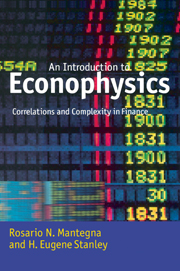Book contents
- Frontmatter
- Contents
- Preface
- Dedication
- 1 Introduction
- 2 Efficient market hypothesis
- 3 Random walk
- 4 Lévy stochastic processes and limit theorems
- 5 Scales in financial data
- 6 Stationarity and time correlation
- 7 Time correlation in financial time series
- 8 Stochastic models of price dynamics
- 9 Scaling and its breakdown
- 10 ARCH and GARCH processes
- 11 Financial markets and turbulence
- 12 Correlation and anticorrelation between stocks
- 13 Taxonomy of a stock portfolio
- 14 Options in idealized markets
- 15 Options in real markets
- Appendix A: Notation guide
- Appendix B: Martingales
- References
- Index
2 - Efficient market hypothesis
Published online by Cambridge University Press: 04 June 2010
- Frontmatter
- Contents
- Preface
- Dedication
- 1 Introduction
- 2 Efficient market hypothesis
- 3 Random walk
- 4 Lévy stochastic processes and limit theorems
- 5 Scales in financial data
- 6 Stationarity and time correlation
- 7 Time correlation in financial time series
- 8 Stochastic models of price dynamics
- 9 Scaling and its breakdown
- 10 ARCH and GARCH processes
- 11 Financial markets and turbulence
- 12 Correlation and anticorrelation between stocks
- 13 Taxonomy of a stock portfolio
- 14 Options in idealized markets
- 15 Options in real markets
- Appendix A: Notation guide
- Appendix B: Martingales
- References
- Index
Summary
Concepts, paradigms, and variables
Financial markets are systems in which a large number of traders interact with one another and react to external information in order to determine the best price for a given item. The goods might be as different as animals, ore, equities, currencies, or bonds – or derivative products issued on those underlying financial goods. Some markets are localized in specific cities (e.g., New York, Tokyo, and London) while others (such as the foreign exchange market) are delocalized and accessible all over the world.
When one inspects a time series of the time evolution of the price, volume, and number of transactions of a financial product, one recognizes that the time evolution is unpredictable. At first sight, one might sense a curious paradox. An important time series, such as the price of a financial good, is essentially indistinguishable from a stochastic process. There are deep reasons for this kind of behavior, and in this chapter we will examine some of these.
Arbitrage
A key concept for the understanding of markets is the concept of arbitrage – the purchase and sale of the same or equivalent security in order to profit from price discrepancies. Two simple examples illustrate this concept. At a given time, 1 kg of oranges costs 0.60 euro in Naples and 0.50 USD in Miami.
Information
- Type
- Chapter
- Information
- Introduction to EconophysicsCorrelations and Complexity in Finance, pp. 8 - 13Publisher: Cambridge University PressPrint publication year: 1999
